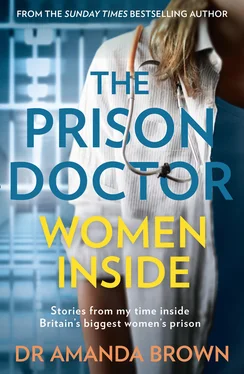Gloria had come straight from the court where she had been sentenced, so it was clear that whatever she felt, the judge felt differently.
Fraud is not an uncommon crime, and includes benefit fraud and other far more elaborate types of fraud, including complex money laundering. This is one of the convictions that many women really struggle to come terms with. They often feel angry that they have ended up in prison as they didn’t realise the severity of what they were doing.
I asked her about her long and complicated medical history. As we chatted it was clear that Gloria’s main support was from her husband, Reg. They lived north of Manchester on their own and didn’t have children. They only had each other.
‘It’s not going to be easy for him to come and see me, is it?’ she said, looking despondent
‘When you get to the house block, have a chat with the officers,’ I told her. ‘They’ll be able to help you, and tell you what you need to do next to try and arrange a visit.’
I knew the prison did their best to help residents maintain family ties by facilitating visits and contact, but of course, as with most things in life, there are forms to fill and protocols to follow.
‘Who’s going to help me get in and out of bed?’ she asked. ‘Reg does that for me. He gets me up, cooks my breakfast and helps me get dressed. He sits me in front of This Morning on the TV, before he goes to get the paper.
‘I’ll be lost without him,’ she continued. ‘I just don’t know how I’m going to cope.’
She continued to tell me about their daily routine, down to the finest detail, with Reg featuring in every element of her day. I felt for Gloria. Her sentence was years, not months, and it was going to be hard for her to adjust, assuming she ever would.
Thirty minutes later, I had completed her notes on the computer and prescribed everything she would need for the time being. She looked relieved but nervous.
‘They will get my pills to me on time, won’t they?’ she asked, her eyes flicking from me to the computer and back again.
For many women, the fact they are not allowed to keep their medication with them, that it is handed out by the nurses, is another loss of liberty.
‘The nurses will give your medication to you each day,’ I explained. ‘Once you are settled, you will have an in-possession risk assessment – it’s called an IPRA – to see if you can look after your own medication. But up until then, I’m afraid you’ll just have to go to the nurses for it.’
She looked resigned to the fact that there was nothing she could say to alter the situation.
She added: ‘The other thing is I also suffer from claustrophobia. I hate being in lifts, and any small space, in fact. Even being in this room makes me feel nervous.’
Gloria’s new home would be a small cell, with only enough space for a narrow bed, sink, desk and a toilet. With a door that would be locked. And many doors would be locked behind that door.
As I finished my shift that evening and walked across the car park to make my way home around the M25, I wondered how Gloria, Rebecca and Shannon, and the other women I had met that night, would cope with the new phase of their lives. How prepared they would be for the many challenges they might face, and how they would handle them.
‘I know I am being punished but I don’t want my child to be punished too’
‘Just look at his tiny fingers.’
I was sitting in the little consulting room in the Healthcare wing one morning during my regular clinic. In front of me was a new mother gazing into her buggy. Inside the buggy was the most beautiful baby, his face all scrunched up, his fists clenched and hot cheeks glowing. His eyes twitched and opened momentarily like he was having the most vivid and exhilarating dream. At four weeks old, the smattering of milk spots on his nose, cheeks and forehead, a common and completely normal skin condition that babies get, were starting to fade. Megan had tucked him in carefully, with a soft grey blanket decorated with ducks, covering him to his chest. On his head, he was wearing a knitted blue hat.
‘He’s gorgeous, Megan. I’m really happy for you.’ I smiled at her. ‘Congratulations.’
‘I never thought I could love something as much as I love him,’ she continued, looking tenderly at him. ‘Dylan has made me want to be a better person, to do better, y’know?’
I nodded.
As a mother, of course I knew. There is something about having children that makes most people determined to be the best versions of themselves they can possibly be.
My regular GP clinic at Bronzefield does not discriminate. In addition to dealing with lots of drug and alcohol issues, patients arrive with a whole selection of medical complaints, some more serious than others. From time to time, this includes new mothers, who enter my clinic with their little charges in tow. They are just like any other mothers of newborns outside prison: usually exhausted and often with grey shadows under their eyes, sometimes pale and feeling sore after the birth, but more often than not, completely in love with their babies.
She brushed her hand through her cropped, dyed red hair and gazed lovingly at her son.
‘I do feel guilty he’s been born while I’m in here,’ she added. ‘I don’t want him to hate me for it when he’s older. But I’m going to make it up to him. Do better. I know I’m being punished but I don’t want him to be punished too. I’m trying to make the best of it.
‘My room on the MBU is great, I love it there. I’ve made it really cosy and Dylan has his little corner with all his stuff. I never knew babies could get through so many nappies and clothes!’
Alongside the house blocks at Bronzefield is an established twelve-room Mother and Baby Unit (MBU). As well as rooms for single babies, there is one room specifically designed for mothers of twins, taking the child capacity to thirteen. This allows women who give birth while they are in prison to stay with their children until they are 18 months old.
Megan had moved to the unit as soon as she returned from hospital just after she had given birth.
‘I was like a whale before Dylan was born, my bump got to a room five minutes before I did,’ she laughed. ‘I was enormous!’
‘How was the birth?’ I asked.
‘I went by ambulance to the local hospital. It was a bit weird, having the officers there with me, but at least I didn’t have to be cuffed to them. The rules have changed, apparently,’ she said.
‘They were outside the room and I was screaming and shouting so much I had a sore throat afterwards! They were nice though, and joked that their ears were ringing when it was all finally over.’ She then smiled sadly. ‘I could choose a birthing partner to be with me, and I’d have loved my mum to be with me, y’know, or my sister, but they live too far away.
‘I can’t wait for them to meet him at next month’s Stay and Play Day at the MBU. Mum is absolutely desperate to meet him.
‘The birth went on for hours. It was so painful, I thought I was gonna die,’ she said, rhythmically pushing her buggy backwards and forwards in the tiny room. ‘Honestly, it’s a bit of a blur now. But he’s okay, and that’s all that matters, really, isn’t it?’
‘Of course it is, you’ve done really well… I hope you’re managing to get as much rest as you can. It’s so important,’ I told her. ‘So, how can I help you today, Megan?’
‘It’s my tits. They’ve both been a bit sore, but now the left one’s red and feels rock hard and like it’s on fire. It’s really painful too!’
‘Okay, let’s have a look and see what’s going on. Can you lie down on the couch and let me examine you?’
Читать дальше












